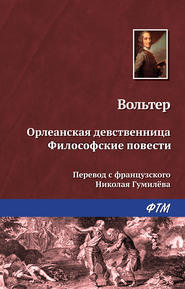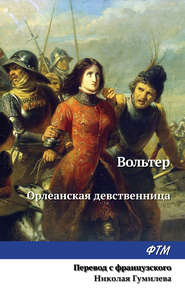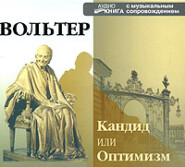По всем вопросам обращайтесь на: info@litportal.ru
(©) 2003-2024.
✖
A Philosophical Dictionary, Volume 02
Настройки чтения
Размер шрифта
Высота строк
Поля
A century had scarcely elapsed since King James himself – called by Henry IV. Master James – that great enemy of the Roman communion and the papal power, had published his "Demonology" (what a book for a king!) and in it had admitted sorceries, incubuses, and succubuses, and acknowledged the power of the devil, and of the pope, who, according to him, had just as good a right to drive Satan from the bodies of the possessed as any other priest. And we, miserable Frenchmen, who boast of having recovered some small part of our senses, in what a horrid sink of stupid barbarism were we then immersed! Not a parliament, not a presidential court, but was occupied in trying sorcerers; not a great jurisconsult who did not write memorials on possessions by the devil. France resounded with the cries of poor imbecile creatures whom the judges, after making them believe that they had danced round a cauldron, tortured and put to death without pity, in horrible torments. Catholics and Protestants were alike infected with this absurd and frightful superstition; the pretext being that in one of the Christian gospels it is said that disciples were sent to cast out devils. It was a sacred duty to put girls to the torture in order to make them confess that they had lain with Satan, and that they had fallen in love with him in the form of a goat. All the particulars of the meetings of the girls with this goat were detailed in the trials of the unfortunate individuals. They were burned at last, whether they confessed or denied; and France was one vast theatre of judicial carnage.
I have before me a collection of these infernal proceedings, made by a counsellor of the Parliament of Bordeaux, named De Langre, and addressed to Monseigneur Silleri, chancellor of France, without Monseigneur Silleri's having ever thought of enlightening those infamous magistrates. But, indeed, it would have been necessary to begin by enlightening the chancellor himself. What was France at that time? A continual St. Bartholomew – from the massacre of Vassy to the assassination of Marshal d'Ancre and his innocent wife.
Will it be believed that in the time of this very Bekker, a poor girl named Magdalen Chaudron, who had been persuaded that she was a witch, was burned at Geneva?
The following is a very exact summary of the procès-verbal of this absurd and horrid act, which is not the last monument of the kind:
"Michelle, having met the devil as she was going out of the town, the devil gave her a kiss, received her homage, and imprinted on her upper lip and her right breast the mark which it is his custom to affix on all persons whom he recognizes as his favorites. This seal of the devil is a small sign-manual, which, as demonological jurisconsults affirm, renders the skin insensible.
"The devil ordered Michelle Chaudron to bewitch two girls; and she immediately obeyed her lord. The relatives of the young women judicially charged her with devilish practices, and the girls themselves were interrogated and confronted with the accused. They testified that they constantly felt a swarming of ants in certain parts of their bodies, and that they were possessed. The physicians were then called in, or at least those who then passed as physicians. They visited the girls and sought on Michelle's body for the devil's seal, which the procès-verbal calls the satanic marks. They thrust a large needle into the spot, and this of itself was a grievous torture. Blood flowed from the puncture; and Michelle made known by her cries that satanic marks do not produce insensibility. The judges, seeing no satisfactory evidence that Michelle Chaudron was a witch, had her put to the torture, which never fails to bring forth proofs. The unfortunate girl, yielding at length to the violence of her tortures, confessed whatever was required of her.
"The physicians again sought for the satanic mark. They found it in a small dark spot on one of her thighs. They applied the needle; but the torture had been so excessive that the poor, expiring creature scarcely felt the wound; she did not cry out; therefore the crime was satisfactorily proved. But, as manners were becoming less rude, she was not burned until she had been hanged."
Every tribunal in Christian Europe still rings with similar condemnations; so long did this barbarous imbecility endure, that even in our own day, at Würzburg, in Franconia, there was a witch burned in 1750. And what a witch! A young woman of quality, the abbess of a convent! and in our own times, under the empire of Maria Theresa of Austria!
These horrors, by which Europe was so long filled, determined Bekker to fight against the devil. In vain was he told, in prose and verse, that he was doing wrong to attack him, seeing that he was extremely like him, being horribly ugly; nothing could stop him. He began with absolutely denying the power of Satan; and even grew so bold as to maintain that he does not exist. "If," said he, "there were a devil, he would revenge the war which I make upon him."
Bekker reasoned but too well in saying that if the devil existed he would punish him. His brother ministers took Satan's part and suspended Bekker; for heretics will also excommunicate; and in the article of cursing, Geneva mimics Rome.
Bekker enters on his subject in the second volume. According to him, the serpent which seduced our first parents was not a devil, but a real serpent; as Balaam's ass was a real ass, and as the whale that swallowed Jonah was a real whale. It was so decidedly a real serpent, that all its species, which had before walked on their feet, were condemned to crawl on their bellies. No serpent, no animal of any kind, is called Satan, or Beelzebub, or devil, in the Pentateuch. There is not so much as an allusion to Satan. The Dutch destroyer of Satan does, indeed, admit the existence of angels; but at the same time he assures us that it cannot be proved by reasoning. "And if there are any," says he, in the eighth chapter of his second volume, "it is hard to say what they are. The Scripture tells us nothing about their nature, nor in what the nature of a spirit consists. The Bible was made, not for angels, but for men; Jesus was made a man for us, not an angel."
If Bekker has so many scruples concerning angels, it is not to be wondered at that he has some concerning devils; and it is very amusing to see into what contortions he puts his mind in order to avail himself of such texts as appear to be in his favor and to evade such as are against him.
He does his utmost to prove that the devil had nothing to do with the afflictions of Job; and here he is even more prolix than the friends of that holy man.
There is great probability that he was condemned only through the ill-humor of his judges at having lost so much time in reading his work. If the devil himself had been forced to read Bekker's "World Bewitched" he could never have forgiven the fault of having so prodigiously wearied him.
One of our Dutch divine's greatest difficulties is to explain these words: "Jesus was transported by the spirit into the desert to be tempted by the devil." No text can be clearer. A divine may write against Beelzebub as much as he pleases, but he must of necessity admit his existence; he may then explain the difficult texts if he can.
Whoever desires to know precisely what the devil is may be informed by referring to the Jesuit Scott; no one has spoken of him more at length; he is much worse than Bekker.
Consulting history, where the ancient origin of the devil is to be found in the doctrine of the Persians, Ahrimanes, the bad principle, corrupts all that the good principle had made salutary. Among the Egyptians, Typhon does all the harm he can; while Oshireth, whom we call Osiris, does, together with Isheth, or Isis, all the good of which he is capable.
Before the Egyptians and Persians, Mozazor, among the Indians, had revolted against God and become the devil, but God had at last pardoned him. If Bekker and the Socinians had known this anecdote of the fall of the Indian angels and their restoration, they would have availed themselves of it to support their opinion that hell is not perpetual, and to give hopes of salvation to such of the damned as read their books.
The Jews, as has already been observed, never spoke of the fall of the angels in the Old Testament; but it is mentioned in the New.
About the period of the establishment of Christianity a book was attributed to "Enoch, the seventh man after Adam," concerning the devil and his associates. Enoch gives us the names of the leaders of the rebellious and the faithful angels, but he does not say that war was in heaven; on the contrary, the fight was upon a mountain of the earth, and it was for the possession of young women.
St. Jude cites this book in his Epistle: "And the angels, which kept not their first estate, but left their own habitation, he hath reserved in everlasting chains under darkness, unto the judgment of the great day… Woe unto them, for they have gone in the way of Cain… And Enoch, also, the seventh from Adam, prophesied of these…"
St. Peter in his second Epistle alludes to the Book of Enoch when he says: "For if God spared not the angels that sinned, but cast them down to hell and delivered them into chains of darkness…"
Bekker must have found it difficult to resist passages so formal. However, he was even more inflexible on the subject of devils than on that of angels; he would not be subdued by the Book of Enoch, the seventh man from Adam; he maintained that there was no more a devil than there was a book of Enoch. He said that the devil was imitated from ancient mythology, that it was an old story revived, and that we are nothing more than plagiarists.
We may at the present day be asked why we call that Lucifer the evil spirit, whom the Hebrew version, and the book attributed to Enoch, named Samyaza. It is because we understand Latin better than Hebrew.
But whether Lucifer be the planet Venus, or the Samyaza of Enoch, or the Satan of the Babylonians, or the Mozazor of the Indians, or the Typhon of the Egyptians, Bekker was right in saying that so enormous a power ought not to be attributed to him as that with which, even down to our own times, he has been believed to be invested. It is too much to have immolated to him a woman of quality of Würzburg, Magdalen Chaudron, the curate of Gaupidi, the wife of Marshal d'Ancre, and more than a hundred thousand other wizards and witches, in the space of thirteen hundred years, in Christian states. Had Belthazar Bekker been content with paring the devil's nails, he would have been very well received; but when a curate would annihilate the devil he loses his cure.
BELIEF
We shall see at the article "Certainty" that we ought often to be very uncertain of what we are certain of; and that we may fail in good sense when deciding according to what is called common sense. But what is it that we call believing?
A Turk comes and says to me, "I believe that the angel Gabriel often descended from the empyrean, to bring Mahomet leaves of the Koran, written on blue vellum."
Well, Mustapha, and on what does thy shaven head found its belief of this incredible thing?
"On this: That there are the greatest probabilities that I have not been deceived in the relation of these improbable prodigies; that Abubeker, the father-in-law, Ali, the son-in-law, Aisha, or Aisse, the daughter, Omar, and Osman, certified the truth of the fact in the presence of fifty thousand men – gathered together all the leaves, read them to the faithful, and attested that not a word had been altered.
"That we have never had but one Koran, which has never been contradicted by another Koran. That God has never permitted the least alteration to be made in this book.
"That its doctrine and precepts are the perfection of reason. Its doctrine consists in the unity of God, for Whom we must live and die; in the immortality of the soul; the eternal rewards of the just and punishments of the wicked; and the mission of our great prophet Mahomet, proved by victories.
"Its precepts are: To be just and valiant; to give alms to the poor; to abstain from that enormous number of women whom the Eastern princes, and in particular the petty Jewish kings, took to themselves without scruple; to renounce the good wines of Engaddi and Tadmor, which those drunken Hebrews have so praised in their books; to pray to God five times a day, etc.
"This sublime religion has been confirmed by the miracle of all others the finest, the most constant, and best verified in the history of the world; that Mahomet, persecuted by the gross and absurd scholastic magistrates who decreed his arrest, and obliged to quit his country, returned victorious; that he made his imbecile and sanguinary enemies his footstool; that he all his life fought the battles of the Lord; that with a small number he always triumphed over the greater number; that he and his successors have converted one-half of the earth; and that, with God's help, we shall one day convert the other half."
Nothing can be arrayed in more dazzling colors. Yet Mustapha, while believing so firmly, always feels some small shadows of doubt arising in his soul when he hears any difficulties started respecting the visits of the angel Gabriel; the sura or chapter brought from heaven to declare that the great prophet was not a cuckold; or the mare Borak, which carried him in one night from Mecca to Jerusalem. Mustapha stammers; he makes very bad answers, at which he blushes; yet he not only tells you that he believes, but would also persuade you to believe. You press Mustapha; he still gapes and stares, and at last goes away to wash himself in honor of Allah, beginning his ablution at the elbow and ending with the forefinger.
Is Mustapha really persuaded – convinced of all that he has told us? Is he perfectly sure that Mahomet was sent by God, as he is sure that the city of Stamboul exists? as he is sure that the Empress Catherine II. sent a fleet from the remotest seas of the North to land troops in Peloponnesus – a thing as astonishing as the journey from Mecca to Jerusalem in one night – and that this fleet destroyed that of the Ottomans in the Dardanelles?
The truth is that Mustapha believes what he does not believe. He has been accustomed to pronounce, with his mollah, certain words which he takes for ideas. To believe is very often to doubt.
"Why do you believe that?" says Harpagon. "I believe it because I believe it," answers Master Jacques; and most men might return the same answer.
Believe me fully, my dear reader, when I say one must not believe too easily. But what shall we say of those who would persuade others of what they themselves do not believe? and what of the monsters who persecute their brethren in the humble and rational doctrine of doubt and self-distrust?
BETHSHEMESH
Of the Fifty Thousand and Seventy Jews Struck with Sudden Death for Having Looked Upon the Ark; of the Five Golden Emeroids Paid by the Philistines; and of Dr. Kennicott's Incredulity
Men of the world will perhaps be astonished to find this word the subject of an article; but we here address only the learned and ask their instruction.
Bethshemesh was a village belonging to God's people, situated, according to commentators, two miles north of Jerusalem. The Phœnicians having, in Samuel's time, beaten the Jews, and taken from them their Ark of alliance in the battle, in which they killed thirty thousand of their men, were severely punished for it by the Lord:
"Percussit eos in secretiori parte natium, et ebullierunt villæ et agri… et nati sunt mures, et facta est confusio mortis magna in civitate." Literally: "He struck them in the most secret part of the buttocks; and the fields and the farmhouses were troubled… and there sprung up mice; and there was a great confusion of death in the city."
The prophets of the Phœnicians, or Philistines, having informed them that they could deliver themselves from the scourge only by giving to the Lord five golden mice and five golden emeroids, and sending him back the Jewish Ark, they fulfilled this order, and, according to the express command of their prophets sent back the Ark with the mice and emeroids on a wagon drawn by two cows, with each a sucking calf and without a driver.
These two cows of themselves took the Ark straight to Bethshemesh. The men of Bethshemesh approached the Ark in order to look at it, which liberty was punished yet more severely than the profanation by the Phœnicians had been. The Lord struck with sudden death seventy men of the people, and fifty thousand of the populace.
The reverend Doctor Kennicott, an Irishman, printed in 1768 a French commentary on this occurrence and dedicated it to the bishop of Oxford. At the head of this commentary he entitles himself Doctor of Divinity, member of the Royal Society of London, of the Palatine Academy, of the Academy of Göttingen, and of the Academy of Inscriptions at Paris. All that I know of the matter is that he is not of the Academy of Inscriptions at Paris. Perhaps he is one of its correspondents. His vast erudition may have deceived him, but titles are distinct from things.
He informs the public that his pamphlet is sold at Paris by Saillant and Molini, at Rome by Monaldini, at Venice by Pasquali, at Florence by Cambiagi, at Amsterdam by Marc-Michel Rey, at The Hague by Gosse, at Leyden by Jaquau, and in London by Beckett, who receives subscriptions.
In this pamphlet he pretends to prove that the Scripture text has been corrupted. Here we must be permitted to differ with him. Nearly all Bibles agree in these expressions: seventy men of the people and fifty thousand of the populace —"De populo septuaginta viros, et quinquaginta millia plebis." The reverend Doctor Kennicott says to the right reverend the lord bishop of Oxford that formerly there were strong prejudices in favor of the Hebrew text, but that for seventeen years his lordship and himself have been freed from their prejudices, after the deliberate and attentive perusal of this chapter.
In this we differ from Dr. Kennicott, and the more we read this chapter the more we reverence the ways of the Lord, which are not our ways. It is impossible, says Kennicott, for the candid reader not to feel astonished and affected at the contemplation of fifty thousand men destroyed in one village – men, too, employed in gathering the harvest.

















